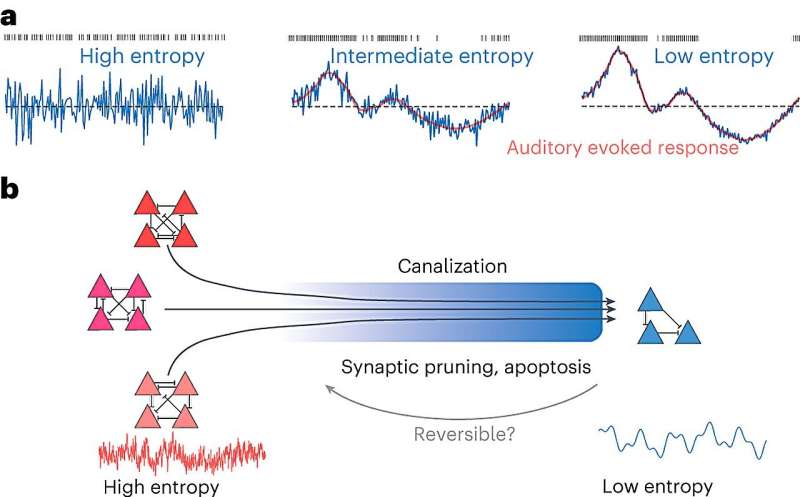March 5, 2024 report
This article has been reviewed according to Science X's editorial process and policies. Editors have highlighted the following attributes while ensuring the content's credibility:
fact-checked
peer-reviewed publication
trusted source
proofread
Complexity of brain activity found to decrease with fetal maturation and to continue decline after birth

A team of neurologists and biotechnicians at University Hospital and University of Tübingen, working with a colleague from Imperial College London, reports that brain complexity decreases during fetal maturation and continues after birth.
In their paper published in the journal Nature Mental Health, the group describes how they used a relatively new type of technology called magnetoencephalography (MEG) to record fetal magnetic brain signals and what they learned from the results.
Prior research has suggested that many brain disorders such as autism and schizophrenia get their start in the womb—findings suggest early interventions may prevent the development of such disorders. Because of that, medical researchers have been looking for ways to study brain development in utero.
That has led to the development of new technology, such as red-light-based MEG, which allows researchers to record fetal magnetic brain signals without causing injury to the mother or the fetus. In this study, the research team used this new technology to study the complexity of signals as a general means of studying brain development.
The researchers recruited several pregnant women and used MEG to record fetal magnetic brain signals starting at 35 weeks and running until birth. This was repeated after birth. Each of the tests involved playing auditory signals in a way that the fetus could hear and recording the response to the signals. To measure complexity, the researchers played patterns of signals, which they then interrupted, giving the fetus or newborn an opportunity to respond to the sudden change.
The researchers found evidence of a decrease in complexity as the fetuses matured, reaching the least complexity just before birth. They also found that complexity continued to decrease after birth and that there were gender differences—male fetuses/babies tended to undergo decreases in complexity faster than females.
The researchers were surprised by their results, but after further review, found that they made sense because they suggest that as the brain matures, it moves from disorder toward more ordered patterns of connections, allowing the brain to process more complicated types of information.
More information: Joel Frohlich et al, Sex differences in prenatal development of neural complexity in the human brain, Nature Mental Health (2024). DOI: 10.1038/s44220-024-00206-4
© 2024 Science X Network


















